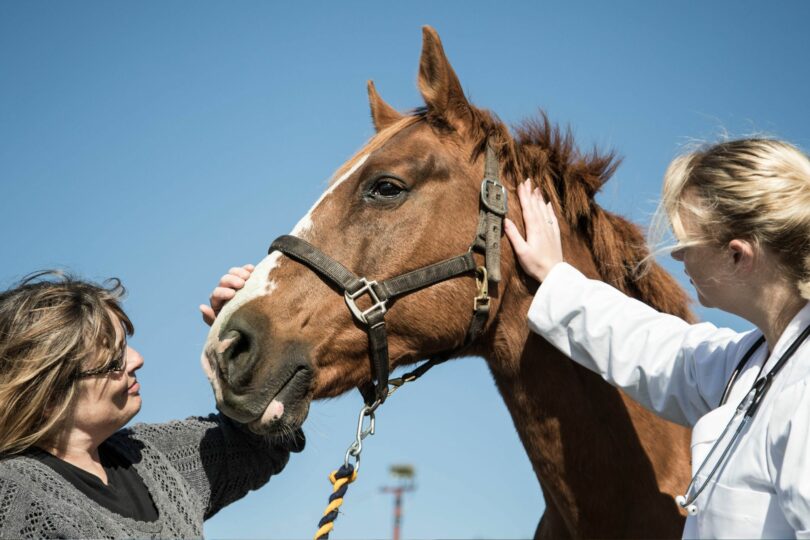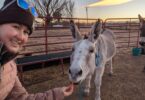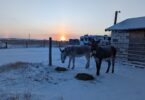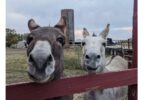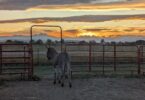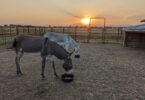Uh oh, it’s a gusher!
Even though horse nosebleeds are relatively common, it doesn’t mean they aren’t scary. Let’s dive into what nosebleeds are, what causes them in horses, and when nosebleeds might be a cause for concern.
A horse’s nose is designed specifically for breathing and is lined with hundreds of small blood vessels. Many factors, including exercise, weather, and allergies, can cause these vessels to rupture, creating a nosebleed. In more serious cases, nosebleeds can be a sign of an underlying condition like a hematoma or an infection.
If the bleeding is heavy, mixed with mucus, or lasts for more than fifteen minutes, call your vet.
Equine Physiology 101
The horse’s nose is highly specialized, designed to take in and send out massive amounts of air quickly. In fact, a horse’s airflow is double the strength of a hairdryer!
The nasal passages are lined with hundreds of tiny blood vessels, as well as membranes that help keep the nose moist.
What A Horse Nosebleed Means
A nosebleed usually means that something caused one of the many blood vessels in the nose to break. In more serious cases, it can be a sign of a viral, bacterial, or fungal infection. Nosebleeds can also be caused by ethmoidal hematomas, or a large mass (similar to a clot).
Racehorses, or any horse participating in strenuous exercise, can also experience nosebleeds. In these cases, the blood is coming from the lungs and not from a ruptured vessel in the nose. This type of nosebleed is caused by EIPH, Exercise-Induced Pulmonary Hemorrhage.
Translation? Your horse’s lungs can bleed after strenuous exercise like running.
The fast exchange of air and increased blood pressure ruptures the blood-gas barrier, allowing red blood cells to flow into the lungs. Sometimes, this blood overflows the lungs and exits through his nose.
Fear not, as EIPH is rarely fatal—just a by-product of extreme exercise.
The Why Behind Horse Nosebleeds
Horse nosebleeds can be caused by any number of things, including strenuous exercise, allergies, hot weather, cold weather, dry weather, or a bump to the head.
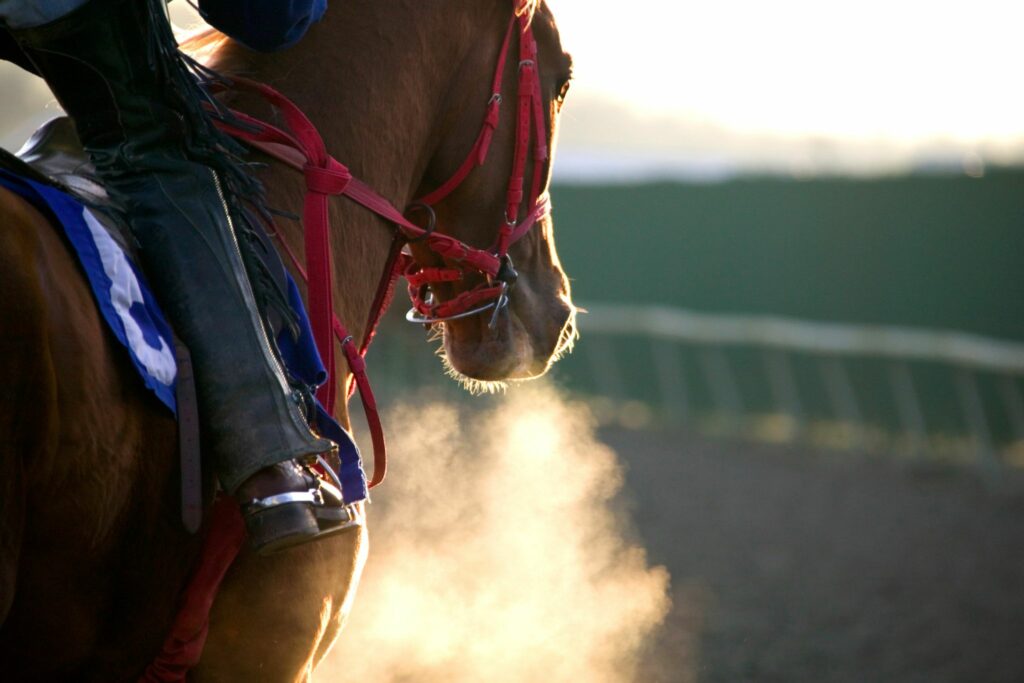
Source: Canva
How to Diagnose a Nosebleed in Horses
Diagnosing a nosebleed is simple: if blood is coming out of your horse’s nose, he has a nosebleed. The blood may be a trickle or a gush, from one or both nostrils, by itself or mixed with mucus.
If the nosebleed requires medical attention, your vet will likely do an endoscopy or take radiographs to determine the cause.
They may also do a biopsy if they find any masses.
What to Do with A Horse Nosebleed
Horses have to breathe through their noses, so don’t stick a rag in your horse’s nose to try and stop the bleeding. Instead, keep an eye on your horse, as the bleeding will most likely resolve on its own.
Keep your horse calm. You can try holding a cool, wet towel or an ice pack below your horse’s eyes (sometimes, this can help stop the bleeding).
When to Call the Vet
Call the vet if the nose blood is mixed with nasal discharge, if the flow is heavy, or if the bleeding hasn’t stopped after fifteen minutes.
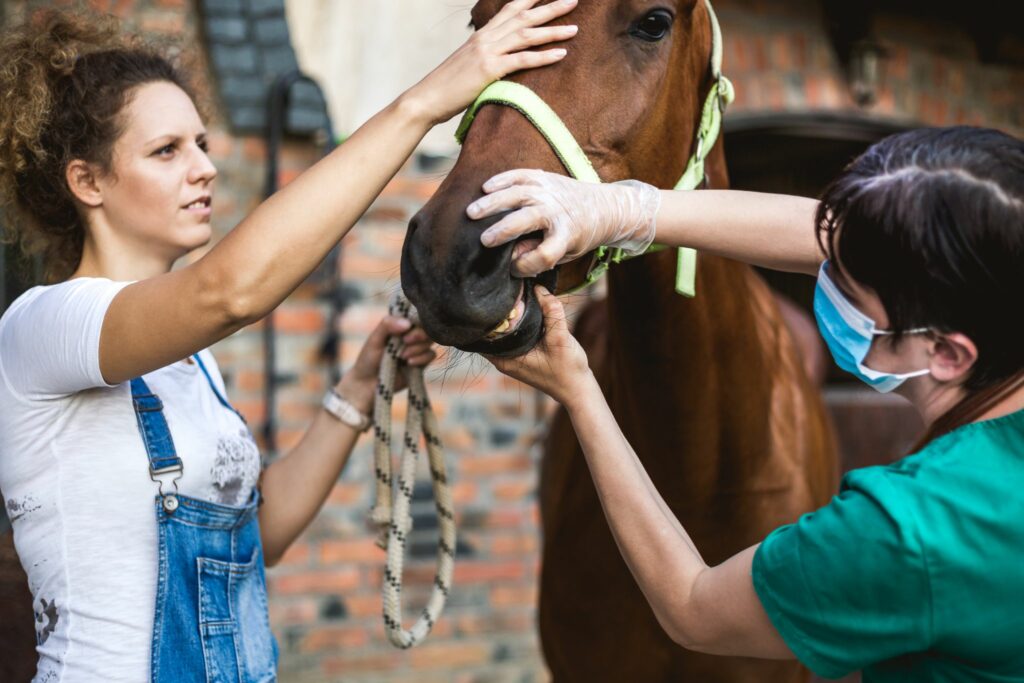
Source: Canva
Frequently Asked Questions
Q: Is it normal for a horse’s nose to bleed?
Nosebleeds are a fairly common phenomenon with horses. Most instances resolve on their own in ten to fifteen minutes.
Q: What causes bloody nasal discharge in horses?
Bloody nasal discharge is caused by a bacterial, viral, or fungal infection in the guttural pouches, or the sacs of air beneath the ears. It can also be caused by a foreign body stuck in the nostril (like a twig) or by sinus cysts.
Q: What does it mean with a horse nosebleed in one nostril?
If your horse is bleeding from just one nostril, this means the bleeding is likely coming from the sinuses, guttural pouches, or the upper airways.
Q: What does it mean with a horse nosebleed in both nostrils?
If your horse is bleeding from both nostrils, this means the bleeding is most likely coming from the lower airways.
Q: When might a horse’s nose bleed in hot weather?
Just like with people, hot weather can cause the tiny capillaries in the nostril to burst, creating a nosebleed.
Q: When might a horse’s nose bleed in cold weather?
Cold weather can have the same effect as hot weather. The cold irritates the nasal mucosa. If your horse exercises, this irritation can lead to a nosebleed.
Q: Why do horses get nosebleeds after running?
Horses get nosebleeds after running because of EIPH. The blood in their lungs can overflow and discharge through their noses.
Q: Can allergies cause horse nosebleeds?
Yep! Allergic reactions to things like pollen or dust dry out the membranes in the nose, leaving them vulnerable to rupturing, which causes nosebleeds.
Parting Thought
While it might be scary to see blood dripping from your horse’s nose, chances are good it’s nothing to worry about. But, when in doubt, contact your vet to be sure!
P.S. Enjoy this article? Trot on over to:
- The Fascinating Science Behind Horse Sweat
- You Can Lead A Horse To Water…Horse Hydration Tips
- Buh-Bye Buckets: 5 Best Automatic Horse Waterers
- Seven Boredom Bustin’ Horse Pasture Toys
- A Pinch Or A Pound? How to Feed Loose Salt to Horses
- Horse Mineral Management: What’s the Best Block to Feed?
- 30+ Equine Nutrition Terms Your Horse Wishes You Knew
Source
Horse Nose Bleeds.cdr (mvma.ca)

